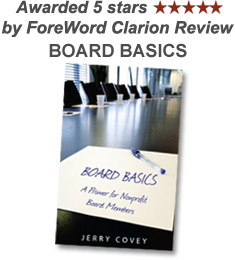Occasionally, I hear nonprofit board members mention their “fiduciary responsibility” usually in reference to caring for their organization’s finances. While financial oversight is certainly an important part of a board’s fiduciary duties, the term fiduciary takes into account a whole lot more than budgetary functions.
In essence, fiduciary responsibility is a special trust relationship between a governing board and its stakeholders. The relationship grants the board legal control of organizational resources and the power to act on behalf of, and for, others. From another view, a fiduciary is a guardian charged with protecting and advancing both stakeholder and organizational interests.
It’s unlikely that you’ll find a specific policy or bylaw called fiduciary responsibility in an organization’s charter, bylaws or policies. What you will find within these documents are specific duties and responsibilities that grant authority for the board to act as the organization’s fiduciary in all matters.
In my book Board Basics: A Primer For Nonprofit Board Members, I identify the board as the arbiter and protector of stakeholder interests. Those inclusive terms speak directly to fiduciary responsibility.
If you want to spark an interesting discussion, ask your fellow board members to list their five most important fiduciary responsibilities and then match up their list with other board members.




Speak Your Mind
You must be logged in to post a comment.